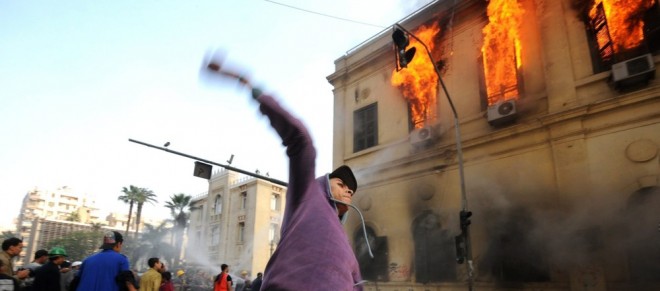Whither Egypt?
Why the economy matters more than Islam
An Egyptian protester throws a stone toward soldiers, unseen, as a building burns during clashes near Tahrir Square, in Cairo, Egypt, Saturday, Dec. 17, 2011. Hundreds of Egyptian soldiers swept into Cairo’s Tahrir Square on Saturday, chasing protesters and beating them to the ground with sticks and tossing journalists’ TV cameras off of balconies in the second day of a violent crackdown on anti-military protesters that has left nine dead and hundreds injured. (AP Photo/Ahmad Hammad)
Share
 In early December, the future of post-Mubarak Egypt became a little clearer after the results of the first round of parliamentary elections were announced. Islamist factions—led by the Freedom and Justice Party (FJP), the political wing of the Muslim Brotherhood—dominated with 60 percent of the vote.
In early December, the future of post-Mubarak Egypt became a little clearer after the results of the first round of parliamentary elections were announced. Islamist factions—led by the Freedom and Justice Party (FJP), the political wing of the Muslim Brotherhood—dominated with 60 percent of the vote.
The second round of the process was held last week. Although the outcome has yet to be announced, early reports indicate that the FJP will again come out on top. The third stage will take place in January and if the rural provinces continue to vote as expected—efforts to blend Islam and politics find more sympathy here than in the cities—Islamism will have quickly secured a place for itself.
On the surface, the implications of this seem obvious. The Sharia (Islamic law) is bound to be introduced. The status of women and Christians, who make up around 10 percent of the total population, will be threatened. And, because Islam is apparently hostile to democracy, the demands for liberty and human rights that continue to be voiced in Tahrir Square will fall on deaf ears. In short, Mubarak’s tyranny will simply be replaced by an uncompromising fundamentalism.
Like most simplistic accounts, though, such a view obscures what is actually a very complex picture.
For instance, in the Qur’an, on which the Sharia is partly based, the term faqta‘u (cut off) is used to describe what should happen to the hand of a thief. Straightforward as it seems, what this means is hardly clear. The hard-line al-Nour—the party that came in second behind the FJP—seems open to a literal definition. But, as some scholars have noted, faqta‘u could just as easily be interpreted as a call to restrain or to isolate in a non-violent way. The latter interpretation is the one the FJP appears to be comfortable with.
In a similar vein, al-Nour has been open about its desire to marginalize women and Christians and restrict democratic freedoms. The more moderate voices in the FJP, on the other hand, have spoken of the need to respect diversity and individual rights.
The point here is that while religion is bound to play an important role in Egypt’s future, assuming that the country is bound to go the way of Saudi Arabia or Afghanistan—where more rigid conceptions of Islam have dominated—is a mistake. Rather, it’s the state of the economy that holds the key to understanding the direction where Egypt might be headed.
The military has played an important role in the Egyptian economy going back to the 1950s, but the floodgates really opened after 1979 once peace was reached with Israel. Fearing what would happen if thousands of soldiers were left with nothing to do, the Egyptian military turned its attention to the business realm. Entire sectors of the economy came under the military’s control during Mubarak’s reign, such as the manufacture of everything from consumer electronics to car parts, furniture, kitchen appliances, television sets and olive oil. Hotels, beach resorts and day-care centers are part of their holdings too. The profits are worth billions and go untaxed. As much as 40 percent of Egypt’s economy may be under the control of the armed forces.
The Brotherhood has so far not turned the military’s economic power into a grievance, probably because it’s still quite anxious to avoid an outright confrontation. Still, if the success it has so far enjoyed at the polls continues, it will have earned a mandate allowing it to push forward its economic agenda, which includes putting an end to economic favouritism and expanding the role of the private sector, both of which stand as obvious threats to the military’s continued dominance.
The Brotherhood has also tended to explain the military’s profiteering as an outgrowth of moral corruption and the absence of Islam from the political sphere. As such, implementing economic reforms could help restore whatever political and religious authority the Brotherhood risks losing in what will surely be a difficult political transition. As for al-Nour, their vow to end “monopolistic practices” within the economy could be interpreted in various ways. Yet—and this is also true of the Brotherhood—their supporters are bound to ask uncomfortable questions if the generals and officers remain a privileged class.
What is clear is that if either group promotes their agenda in a serious way, the response might make the continuing unrest in Tahrir look like a picnic. After all, if the Supreme Council of the Armed forces–the military junta which has ruled Egypt since Mubarak’s resignation in February–has been all too willing to violently suppress calls for democratic freedom, what will it do when its economic interests come under attack?
Peter Fragiskatos holds a PhD in International Relations from Cambridge University and teaches at the University of Western Ontario.